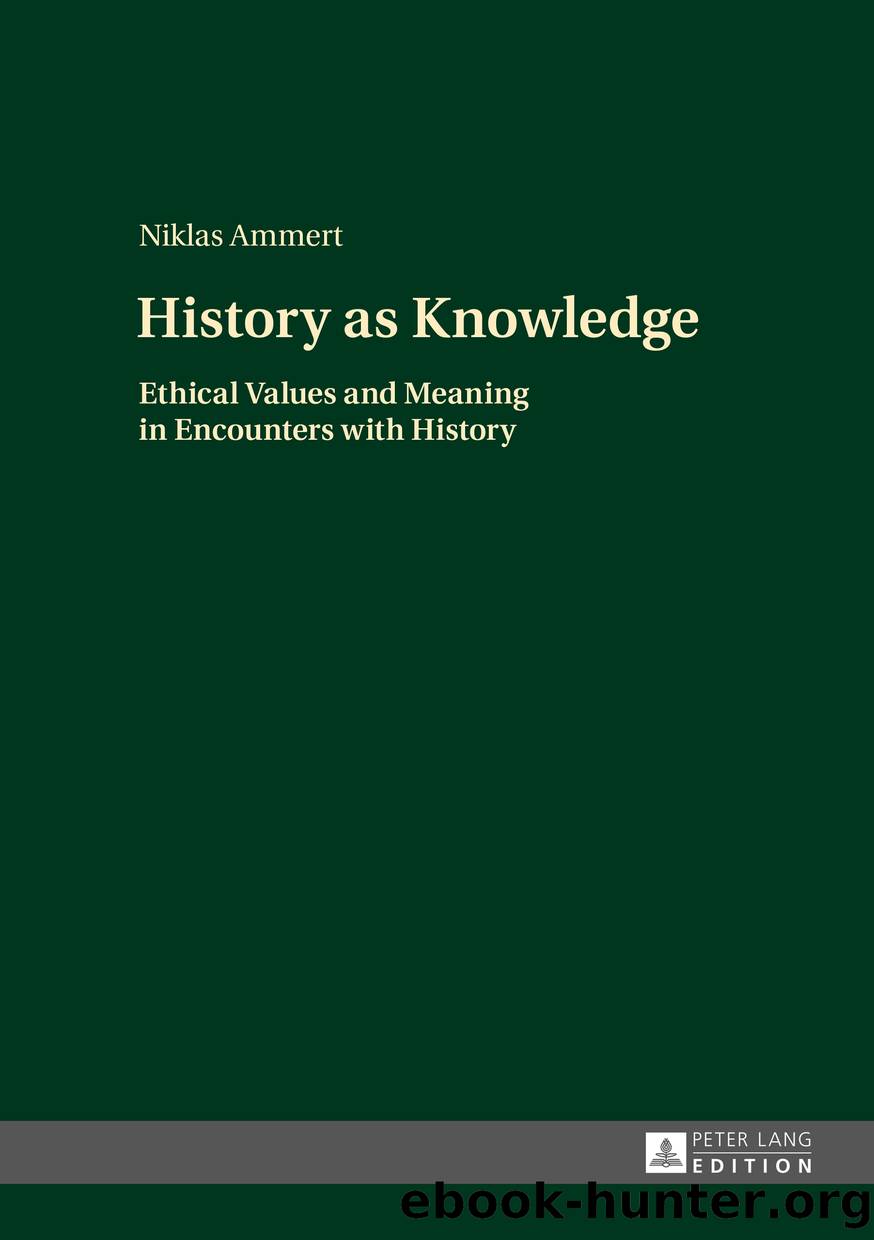History as Knowledge by niklas ammert

Author:niklas ammert
Language: eng
Format: epub
Published: 2018-08-03T00:00:00+00:00
Two patterns of thought
The purpose of this chapter has been to discuss learning as a meaning-making process and how pupils’ express their experience of meaning-making when encountering history. This meaning-making emerges as two distinct patterns of thought.
In the first, meaning-making a lesson in History emerges as a step towards adulthood, but the content does not have any connection to the pupil’s life here and now. Here students perceive the subject to be important to their futures. History helps them develop their meta-cognitive thinking and become good students, which can in turn have importance for future upper secondary education and their professional lives. Students see that knowing history helps them feel educated and able to take part in conversations that may come up at the workplace. The meaning-making that emerges in the pupil responses is that one studies hard for the tests and then one forgets. That has happened, but you do not ← 80 | 81 → feel anything toward it . A bunch of facts to pack in . These types of responses can be interpreted as a sort of making-meaning, but the individual’s self-understanding and worldview are not challenged. Here meaning-making and learning take place within a confirming paradigm – one that reinforces rather than challenges preexisting beliefs
In the other pattern of thought displayed in students’ responses, meaning-making is expressed as a change in self-understanding, which has resulted in a change on a personal level. People might have become a little more humble toward each other expresses a changed sense of sensitivity in meeting others or it has probably changed me a little, because I know myself in a completely different way after this can involve a change that is hard to express in words. In the pupil’s meaning-making in encountering history, a change in one’s understanding of the outside world is also expressed. When asked if learning the new knowledge has changed previously held knowledge, one pupil replies, Yeah, about Hitler and his power and how it really happened, because he became really violent, and how he tricked and changed direction later. In this example of meaning-making, another way to view learning is expressed. This learning is not just about “learning” but also involves the sense of “learning from,” to re-phrase a previous point. The boundaries of the cognitive frame of reference break down. Such cross-boundary learning alters previous understanding. The pupil’s new knowledge affects prior knowledge. In statements such as, you think a little differently now because you know now what has happened and I probably did not really think that it was the way it was, however, it is harder to say to what extent this new knowledge has involved a re-formulation of previous understanding. But as one student points out, people might have become a little more humble toward each other , which may entail a more dramatic change. In this case, the pupil’s personal beliefs might have been brought out and challenged.
The question of how school can create optimal conditions for learning as
Download
This site does not store any files on its server. We only index and link to content provided by other sites. Please contact the content providers to delete copyright contents if any and email us, we'll remove relevant links or contents immediately.
Navigation and Map Reading by K Andrew(4549)
Spare by Prince Harry The Duke of Sussex(4188)
Tuesdays with Morrie by Mitch Albom(3830)
Cracking the GRE Premium Edition with 6 Practice Tests, 2015 (Graduate School Test Preparation) by Princeton Review(3593)
What It Really Takes to Get Into Ivy League and Other Highly Selective Colleges by Hughes Chuck(3217)
Goodbye Paradise(2950)
Never by Ken Follett(2873)
Pledged by Alexandra Robbins(2789)
Kick Ass in College: Highest Rated "How to Study in College" Book | 77 Ninja Study Skills Tips and Career Strategies | Motivational for College Students: A Guerrilla Guide to College Success by Fox Gunnar(2716)
A Dictionary of Sociology by Unknown(2516)
Graduate Admissions Essays, Fourth Edition: Write Your Way into the Graduate School of Your Choice (Graduate Admissions Essays: Write Your Way Into the) by Asher Donald(2473)
Sapiens and Homo Deus by Yuval Noah Harari(2406)
Get into Any College by Tanabe Gen Tanabe Kelly(2382)
Zero to Make by David Lang(2343)
The Social Psychology of Inequality by Unknown(2305)
Machine Learning at Scale with H2O by Gregory Keys | David Whiting(2267)
500 Must-Know AP Microeconomics/Macroeconomics Questions(2239)
Fairy Tale by Stephen King(2058)
Will by Will Smith(2033)
